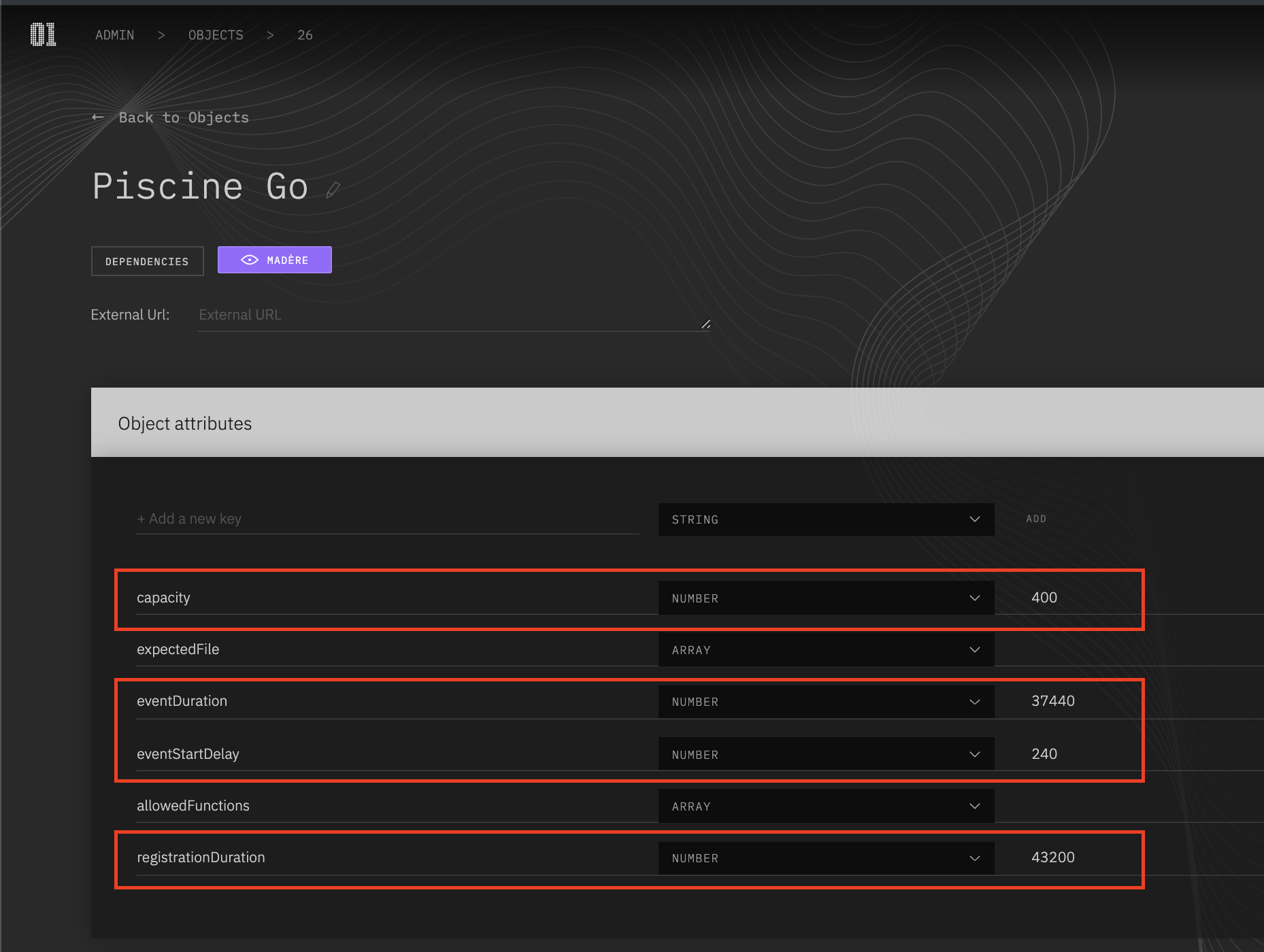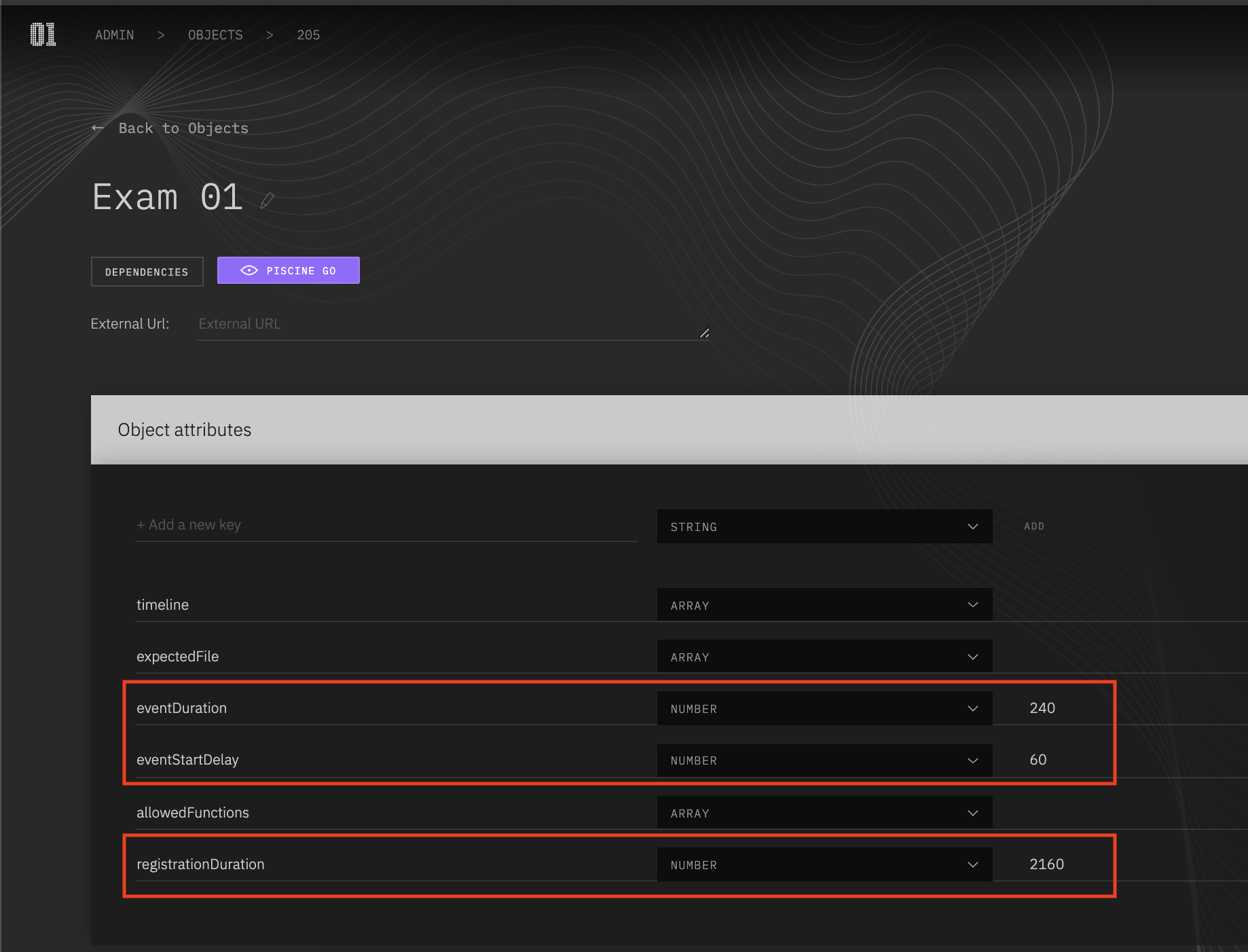# Events management
## Usage
> An event is associated to an object when the usage of this object implies:
> * a limited capacity of people
> * a limited time
> Event management require:
> * Edition of the attributes of the object on which the event is based
> * Creation and settings of the event associated to the initial object
## Settings for the initial object
> Important indications:
> * Objects that doesn't have required attributes for event creation will not be open to event creation.
> | name | fullfillment |
> | -------------------- | --------- |
> | capacity | **required** |
> | eventDuration | **required** |
> | registrationDuration | **required** |
> | description | optionnal |
> | eventStartDelay | optionnal |
> * All the attributes filled in the object are used as values by default for event's creation; it can be overloaded for each event related to the initial object.
> * If the initial object has a child or children which are events itself, settings are also required for each event child.
#### Edit the object attributes:
> in *Object attributes*
 * Add a new key **capacity** of type `Number` with the maximum number of persons you want for events related to the object by default
* Add a new key **eventDuration** of type `Number` with the duration in minutes you want for events related to the object by default
* Add a new key **registrationDuration** of type `Number` with the duration in minutes you want to allow to people to register to the event by default
* Add a new key **eventStartDelay** of type `Number`, if you want a default delay between the end of registration and the beginning of the event. This duration is expressed in minutes.
* Add a new key **description** of type `String`, if you need to associate some informations to your event (description, location, access, documents to provide, etc.)
#### Edit the children
> in *Children*
* Add a new key **capacity** of type `Number` with the maximum number of persons you want for events related to the object by default
* Add a new key **eventDuration** of type `Number` with the duration in minutes you want for events related to the object by default
* Add a new key **registrationDuration** of type `Number` with the duration in minutes you want to allow to people to register to the event by default
* Add a new key **eventStartDelay** of type `Number`, if you want a default delay between the end of registration and the beginning of the event. This duration is expressed in minutes.
* Add a new key **description** of type `String`, if you need to associate some informations to your event (description, location, access, documents to provide, etc.)
#### Edit the children
> in *Children*
 * Add a new key **startAfter** of type `Number`, with the default delay you want between the beginning of the event and the beginning of the child event. This duration is expressed in minutes.
##### Example
Here is an example of the `Piscine Go` settings. It presents the settings of the object attributes `Piscine Go`, the settings of one of its child which is an event and the settings of the child object attributes itself.
> NB : this object settings are provided in the admin, in the curses section: 'Piscine Go' and in the exams section 'Exam 01'.
**Piscine Go**
*Object attributes*
```json
{
"capacity": 400,
"eventDuration": 37440,
"registrationDuration": 43200,
"eventStartDelay": 240
}
```
This piscine object attributes look like this:

*Children*
> In the `Piscine Go`, children of type *exam* and *rush* have events itself.
> A **startAfter** key has to be defined for each of them, in their parent object `Piscine Go`. For example, the exam-01 gets this key:
```json
{
"startAfter": 400
}
```
This child attributes look like this:

**Exam 01**
> The object `Exam 01`, which is a child of `Piscine Go`, has its own *Object Attributes* filled in the child object.
*Object attributes*
```json
{
"eventDuration": 240,
"registrationDuration": 2160,
"eventStartDelay": 60
}
```
> NB: the **capacity** attribute is herited from the parent object `Piscine Go` here.
This exam object attributes look like this:

## Create the event
### Create a new event for your object
### Settings for you event
> In the event you have created, 3 categories must be checked:
> 1. General settings
> 2. Registration's settings
> 3. Event's settings
#### General settings
#### Registration
#### Event
* Add a new key **startAfter** of type `Number`, with the default delay you want between the beginning of the event and the beginning of the child event. This duration is expressed in minutes.
##### Example
Here is an example of the `Piscine Go` settings. It presents the settings of the object attributes `Piscine Go`, the settings of one of its child which is an event and the settings of the child object attributes itself.
> NB : this object settings are provided in the admin, in the curses section: 'Piscine Go' and in the exams section 'Exam 01'.
**Piscine Go**
*Object attributes*
```json
{
"capacity": 400,
"eventDuration": 37440,
"registrationDuration": 43200,
"eventStartDelay": 240
}
```
This piscine object attributes look like this:

*Children*
> In the `Piscine Go`, children of type *exam* and *rush* have events itself.
> A **startAfter** key has to be defined for each of them, in their parent object `Piscine Go`. For example, the exam-01 gets this key:
```json
{
"startAfter": 400
}
```
This child attributes look like this:

**Exam 01**
> The object `Exam 01`, which is a child of `Piscine Go`, has its own *Object Attributes* filled in the child object.
*Object attributes*
```json
{
"eventDuration": 240,
"registrationDuration": 2160,
"eventStartDelay": 60
}
```
> NB: the **capacity** attribute is herited from the parent object `Piscine Go` here.
This exam object attributes look like this:

## Create the event
### Create a new event for your object
### Settings for you event
> In the event you have created, 3 categories must be checked:
> 1. General settings
> 2. Registration's settings
> 3. Event's settings
#### General settings
#### Registration
#### Event
 * Add a new key **capacity** of type `Number` with the maximum number of persons you want for events related to the object by default
* Add a new key **eventDuration** of type `Number` with the duration in minutes you want for events related to the object by default
* Add a new key **registrationDuration** of type `Number` with the duration in minutes you want to allow to people to register to the event by default
* Add a new key **eventStartDelay** of type `Number`, if you want a default delay between the end of registration and the beginning of the event. This duration is expressed in minutes.
* Add a new key **description** of type `String`, if you need to associate some informations to your event (description, location, access, documents to provide, etc.)
#### Edit the children
> in *Children*
* Add a new key **capacity** of type `Number` with the maximum number of persons you want for events related to the object by default
* Add a new key **eventDuration** of type `Number` with the duration in minutes you want for events related to the object by default
* Add a new key **registrationDuration** of type `Number` with the duration in minutes you want to allow to people to register to the event by default
* Add a new key **eventStartDelay** of type `Number`, if you want a default delay between the end of registration and the beginning of the event. This duration is expressed in minutes.
* Add a new key **description** of type `String`, if you need to associate some informations to your event (description, location, access, documents to provide, etc.)
#### Edit the children
> in *Children*
 * Add a new key **startAfter** of type `Number`, with the default delay you want between the beginning of the event and the beginning of the child event. This duration is expressed in minutes.
##### Example
Here is an example of the `Piscine Go` settings. It presents the settings of the object attributes `Piscine Go`, the settings of one of its child which is an event and the settings of the child object attributes itself.
> NB : this object settings are provided in the admin, in the curses section: 'Piscine Go' and in the exams section 'Exam 01'.
**Piscine Go**
*Object attributes*
```json
{
"capacity": 400,
"eventDuration": 37440,
"registrationDuration": 43200,
"eventStartDelay": 240
}
```
This piscine object attributes look like this:

*Children*
> In the `Piscine Go`, children of type *exam* and *rush* have events itself.
> A **startAfter** key has to be defined for each of them, in their parent object `Piscine Go`. For example, the exam-01 gets this key:
```json
{
"startAfter": 400
}
```
This child attributes look like this:

**Exam 01**
> The object `Exam 01`, which is a child of `Piscine Go`, has its own *Object Attributes* filled in the child object.
*Object attributes*
```json
{
"eventDuration": 240,
"registrationDuration": 2160,
"eventStartDelay": 60
}
```
> NB: the **capacity** attribute is herited from the parent object `Piscine Go` here.
This exam object attributes look like this:

## Create the event
### Create a new event for your object
### Settings for you event
> In the event you have created, 3 categories must be checked:
> 1. General settings
> 2. Registration's settings
> 3. Event's settings
#### General settings
#### Registration
#### Event
* Add a new key **startAfter** of type `Number`, with the default delay you want between the beginning of the event and the beginning of the child event. This duration is expressed in minutes.
##### Example
Here is an example of the `Piscine Go` settings. It presents the settings of the object attributes `Piscine Go`, the settings of one of its child which is an event and the settings of the child object attributes itself.
> NB : this object settings are provided in the admin, in the curses section: 'Piscine Go' and in the exams section 'Exam 01'.
**Piscine Go**
*Object attributes*
```json
{
"capacity": 400,
"eventDuration": 37440,
"registrationDuration": 43200,
"eventStartDelay": 240
}
```
This piscine object attributes look like this:

*Children*
> In the `Piscine Go`, children of type *exam* and *rush* have events itself.
> A **startAfter** key has to be defined for each of them, in their parent object `Piscine Go`. For example, the exam-01 gets this key:
```json
{
"startAfter": 400
}
```
This child attributes look like this:

**Exam 01**
> The object `Exam 01`, which is a child of `Piscine Go`, has its own *Object Attributes* filled in the child object.
*Object attributes*
```json
{
"eventDuration": 240,
"registrationDuration": 2160,
"eventStartDelay": 60
}
```
> NB: the **capacity** attribute is herited from the parent object `Piscine Go` here.
This exam object attributes look like this:

## Create the event
### Create a new event for your object
### Settings for you event
> In the event you have created, 3 categories must be checked:
> 1. General settings
> 2. Registration's settings
> 3. Event's settings
#### General settings
#### Registration
#### Event